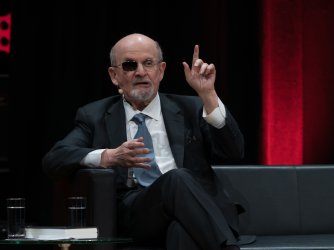Table of Contents
Faculty report from University of Southern California’s business school reveals deep concerns about academic freedom

(Kit Leong / Shutterstock)
A recent internal report from the University of Southern California’s Marshall School of Business paints a troubling picture of academic freedom and faculty confidence in the school’s administration. The report summarizes the findings of a faculty survey assessing reactions to the replacement of a professor because students complained that his example of a common pause word in Chinese sounded like a racial slur in English.
Professor Greg Patton has since apologized for the incident and has declined interviews. Many of his colleagues, meanwhile, are not pleased with how the incident was handled. In their anonymous answers to the survey, they raised questions about due process, questioned whether they could trust the administration to support them in a similar situation, and expressed feeling angry, fearful, threatened, and marginalized:
There was no judge, jury, or anything, only cancellation. If faculty with long records of good performance can lose reputation in a flash or parts of their job for this kind of 5-second mix up, which can happen to anybody by accident given how much material we have to cover, it means we will become a society where people always talk slow, prescreen every word, and take the safest possible route on everything they say. By nature, that will make us irrelevant.
Another commented:
It makes me frightened to teach students who can have a faculty member removed for giving an innocuous example in another language. It makes me feel like the dean’s office is willing to throw faculty under the bus in order [to] preserve the appearance of diversity and inclusion instead of opening up dialogues on both sides. It seems that a more appropriate response would have been to have Chinese-speaking students talk about the relevance of the example used in class to explain why it was a useful example to give. Going forward, based on the discomfort of African American students, I don’t think it’s a big deal to stop using the example, but the current response seems over the top.
A third commented:
I feel extremely vulnerable that one incident that was accidental and not at all with malice of intent could endanger a professor with absolutely no support from the administration. To me, this signals that the administration would rather support an overly sensitive student than a long-time professor who has years of excellent teaching behind him.
Unfortunately, the negative consequences are likely just beginning. The faculty surveyed also expressed a need for caution and that they expected to hold less engaging discussions with students. Some even said they would now avoid diversity and cultural topics entirely:
Unfortunately, it will stifle dialogue with my students. Before, I was careful and cautious about engaging, using all I had learned from numerous seminars and workshops through the years.. Now, I don’t dare engage with students when it is so fraught with unknown ways of unintentionally causing harm.
Another commented:
I will never teach about anything having to do with diversity, or touching on anything having to do with diversity, if I can at all help it. It will clearly get me fired, regardless of how well I do it.
A third commented:
I will avoid any potentially controversial topics, including diversity and inclusion -- which should NOT be controversial. The risk is too great at this point based on the administration's response in this case.
An Emerging and Frightening Trend
The report out of the Marshall School of Business is just the latest example demonstrating an emerging and frightening trend. Academic freedom is coming under threat from sources that are internal to the academy itself—the students and faculty.
This past summer alone is replete with a number of these examples. For instance, at Princeton a petition demanding that the university constitute a committee that would monitor the research and publications of the faculty for racism garnered the signature of over 350 faculty members. At Michigan State, Steven Hsu was forced out of his position as the Vice President of Research and Graduate Studies after a petition by the MSU Graduate Employees Union amassed over 500 signatures from MSU graduate students and faculty. His crime? He discussed whether there are racial differences in intelligence. It did not matter to those leading the charge against Hsu that he has always said that he does not believe such differences exist.
These events, and others, have acted like an accelerant on a smoldering fire. In the last decade, anecdotal and empirical evidence indicates that faculty avoid certain research topics because they fear social sanction. Furthermore, faculty of all political persuasions express a willingness to discriminate against other faculty on the basis of perceived political orientation in hiring, promotion, publication, and the awarding of research funding. Similar findings among faculty in the United Kingdom were also recently reported.
In other words, many faculty have concluded that it may pay to keep one’s mouth shut.
Why Internal Threats to Academic Freedom are so Dangerous
It is not uncommon to see calls for restrictions on academic freedom from outside the academy. Threats to academic freedom from students and faculty themselves, however, pose an additional danger because they can help foster a culture of self-censorship on campus. The faculty at the Marshall School of Business is already operating within one, and it is clear that they are not the only ones.
The consequences of such a culture are profound. As the faculty at the Marshall Business School make clear, their avoidance of certain topics will stifle their students’ intellectual development. There will be less engagement and fewer in-depth discussions of complex topics in what will likely become a more sterile intellectual environment. Many students will only know their side of the argument and have little ground for preferring it.
Outside the classroom, research and scholarship will suffer. For faculty who have chosen careers in the academy, one’s reputation is a form of currency. As noted, faculty openly admit that they would politically discriminate against their colleagues who hold different political views. Some admit they have abandoned certain lines of research because of the anticipated reputational consequences and the impact they could have on one’s career. Why place one’s job, or even one’s career, at risk by investigating a politically controversial topic or worse, publishing a finding that reaches a conclusion that is politically unpalatable to most of your colleagues?
Administrators play a pivotal role in these controversies. Formal complaints about course content, professorial conduct, research methods and practices, or offensive speech are largely adjudicated by campus administrators. Thus, when academic freedom is under assault from internal forces, administrators can act as a bulwark in its defense.
Many of the faculty at the Marshall School of Business made it clear that leadership and support for faculty from the administration during these kinds of controversies would go a long way in creating and sustaining a vibrant intellectual environment. As one of the faculty at the Marshall School of Business put it:
As a faculty, we need to feel respected and valued. The Dean's office forgets about the fact that they have also responsibility to the faculty to provide a collegial work environment where faculty are listened [to] and respected.
The conclusions reached by the administration in the Marshall School of Business report are encouraging because they demonstrate that the faculty are tuned into the problem and because they emphasize the dire need for clear and transparent leadership. But encouraging signals are one thing and clear, decisive action is another. How USC’s administration ultimately resolves the disagreement with its faculty over this controversy will speak volumes about the intellectual environment at USC.
Recent Articles
FIRE’s award-winning Newsdesk covers the free speech news you need to stay informed.

No, the Berkeley Law student didn’t have a First Amendment right to interrupt the dean’s backyard party

Salman Rushdie calls out left-wing censorship in CBS interview

Falsely claiming a First Amendment right at a dinner party at private home — FAN 419.1
